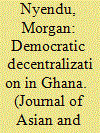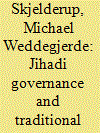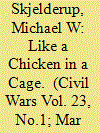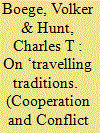| Srl | Item |
| 1 |
ID:
112387


|
|
|
|
|
| Publication |
2012.
|
| Summary/Abstract |
This article examines the effectiveness of Ghana's democratic decentralization policy since its inception in the 1980s. It argues that, in spite of the lofty goals of the policy, its effectiveness has been undermined by the lack of political commitment on the part of central government and its frequent interferences in the functioning of the district assemblies, which provide the framework for the policy. The article concludes that, so far, the policy is more of a process than of substance and recommends some measures that must be taken in any serious review process. This research was carried out largely through interviews, participant observation, newspaper and article reviews and library research in and outside Ghana.
|
|
|
|
|
|
|
|
|
|
|
|
|
|
|
|
| 2 |
ID:
173388


|
|
|
|
|
| Summary/Abstract |
Based on unique field work in southern Somalia, this article explores how the interrelationship between jihadi insurgent rulers and traditional authority structures fostered local order in the southernmost part of Somalia in the period 2008 to 2012. While the Jihadi insurgent group al-Shabaab’s state project was profoundly inspired by jihadi-Salafi ideology when it conquered large parts of South-Central Somalia in 2008–2009, it developed a strategy to cooperate with and co-opt local authority structures. This was partly a pragmatic approach in order to gain control of local institutions and populations. However, utilizing the local clan elders was a practical and cost-effective arrangement through which al-Shabaab could collect material resources, such as money, weapons, new recruits and other local resources. By sustaining the traditional authority structures, al-Shabaab also fostered a degree of trust and legitimacy from the local populations.
|
|
|
|
|
|
|
|
|
|
|
|
|
|
|
|
| 3 |
ID:
179366


|
|
|
|
|
| Summary/Abstract |
This article explores civilian agency and civil resistance under Islamist insurgents’ rule in southern Somalia in the period 2006 to 2012. After almost two decades of civil war, local institutions were weakened and the communities could not resist tight Islamist control. The traditional authorities either fled or chose to cooperate with the new rulers. However, while treading a fine line, traditional authorities were still able to raise community concerns and influence the Islamist rulers’ behaviour through limited forms of civil resistance. Although not changing the overall political situation, traditional authorities were instrumental in reducing tension and improving civilian life.
|
|
|
|
|
|
|
|
|
|
|
|
|
|
|
|
| 4 |
ID:
175363


|
|
|
|
|
| Summary/Abstract |
Important sources of everyday security – variously labelled as customary, informal, traditional or autochthonous – are commonly associated with rural spaces and attributed to the lack of presence or traction of state institutions. However, these practices are not limited to peripheries; they can travel. Their structures, authority and legitimacy can be re-produced in new settings, often in response to the perturbations caused by conflict, while also changing in the course of travel. Consequently, in urban spaces – the supposed ‘centre’ of the modern state – people’s sense of security can be profoundly influenced and shaped by the ordering logics of such ‘travelling traditions’. This has ramifications for ‘emplaced security’ – both short-term responses to acute vulnerability of displaced communities and emergent longer-term forms of order. This article explores the utility of the ‘spatial turn’ in peacebuilding theory for better understanding this phenomenon. It uses the cases of Vanuatu and Liberia to demonstrate how more nuanced understandings of the (re)construction of authority between and across places and scales may help comprehend how people generate everyday emplaced security. A spatial approach provides analytical leverage that can help to highlight how a phenomenon such as travelling traditions contributes to the formation and substance of emplaced security.
|
|
|
|
|
|
|
|
|
|
|
|
|
|
|
|